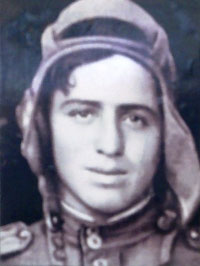
Yon Degen
Yon Degen was born in 1925 in the Ukrainian city of Mogilev-Podolskii. His father was a medic and his mother a nurse. In June 1941, after completing 9th grade, Yon Degen volunteered for a destruction battalion (sabotage unit) made up of 9th and 10th grade graduates. He was seriously wounded when trying to break out of encirclement. After a long hospital recuperation, in June 1942 Degen volunteered again. This time, even though he was not yet 18 (the required age for formal enlistment in the Red Army), he was assigned to intelligence work with the 42nd Separate Armored Division. On October 15, 1942, while serving as commander of an intelligence unit, Degen was wounded during a mission behind enemy lines.
After being released from hospital, by which time he had reached the age of 18, he began studying at a school for tank crews. When he graduated as a junior lieutenant in June 1944, Degen became the commander of a tank in the 2nd Guards' Tank Brigade. He later recalled his feelings as follows: "We felt like doomed men and we didn't give a damn where we would be killed, in a tank attack in our own brigade or by shooting in a punishment battalion." As commander of a tank platoon Degen took part in the Belorussian offensive. In the course of the war he was twice recommended for the title of Hero of the Soviet Union, but on both occasions was given a lesser honor.
For his participation in the liberation of Vilna in 1944 he received the Order of the Patriotic War. Then, during five days of street fighting, Degen's tank destroyed 5 enemy canons, 1 medium sized tank, and 2 infantry units. Only many years later did he learn that the area that he helped liberate had been the location of the Vilna ghetto. During the war Degen wrote poems. One of them "My Comrade, in Your Mortal Agony..." became famous. It was included in Vasilii Grossman's novel Life and Fate.
In January 1945 Degen was seriously wounded again. While he was trying to climb out of his burning tank both of his arms and legs were struck by shrapnel. After being released from hospital, he was demobilized and was scheduled to study at a tank institute. However, he ended up enrolling at a medical institute instead. After graduating in 1951, he worked in Kiev as a specialist in orthopedic trauma, becoming one of the leading specialists in that field in the Soviet Union.
After repatriating to Israel in 1977, he worked as an orthopedist for more than 20 years. In Israel he continued his writing activity, which he had begun before the war. He is the author of several collections of poetry and of stories. Degen is the only Soviet tank crew member to be honored by being accepted into the Association of Israeli Tankists who were honored for heroism.
On September 9, 2014 a film about this hero, "Degen," by the Russian-Jewish directors Mikhail Degtiar and Iulii Melamed was premiered at the Israeli Armored Corps Memorial at Latrun.
Related Resources
War-time poem by Yon Degen
In December 1944 Yon Degen wrote the poem "Moi tovarishch, v smertel'noi agonii" (My Comrade, in Your Mortal Agony) which during the war circulated widely from hand to hand, in different versions. At the time it was referred to as a poem by an unknown front-line soldier. Only in the late 1980s was Degen's authorship recognized. The following is a translation of the poem:
|
Мой товарищ, в смертельной агонии |
My comrade, in your mortal agony |
Visit of Yon Degen to Vilnius
This is how Yon Degen described his visit to area of the former Vilna Ghetto that took place during the 1970s:
"An elderly woman answered my questions unwillingly. Yes, she was a local, yes, she knew that in that place that completed the square, there had stood a large four-story building. Just there, to the left of the church, during the war was the Jewish ghetto.
The woman left. My wife and son didn't say anything, leaving me alone with my memories.
That apparently meant that for five days I was fighting in the [former] Jewish ghetto without having any idea that I was doing so. Perhaps that meant that there was a reason that the Jewish partisans had come to that place?
Nothing is random. Even in the hell of street battles, it seems, there was a logic that aroused my genetic memory. In the summer of 1975 I was finally a Jew. I understood. But then…."
Yon Degen, "Vilnius," Alef, vol. 325-338 (1990), p. 48.






